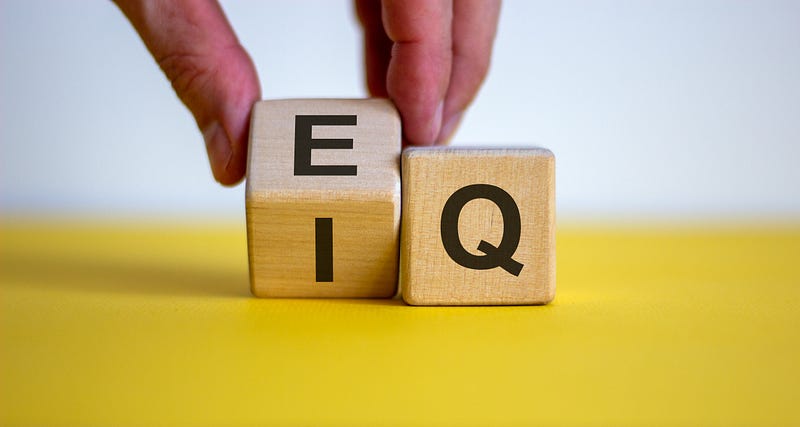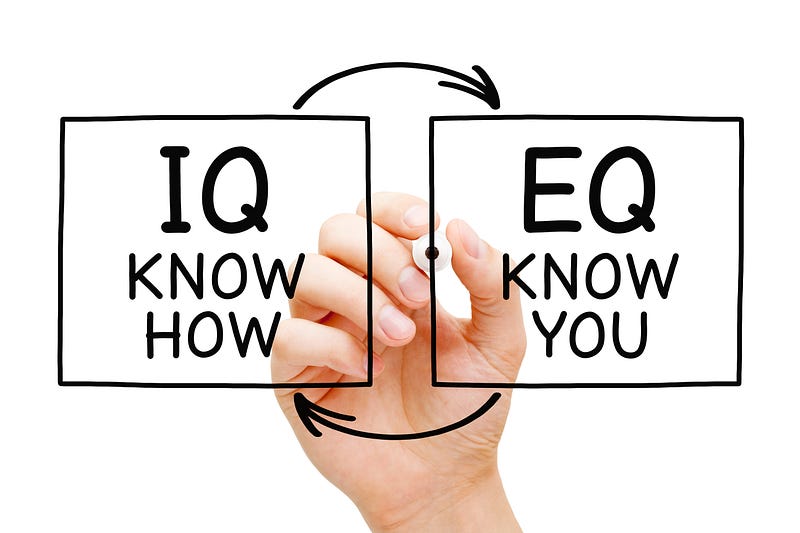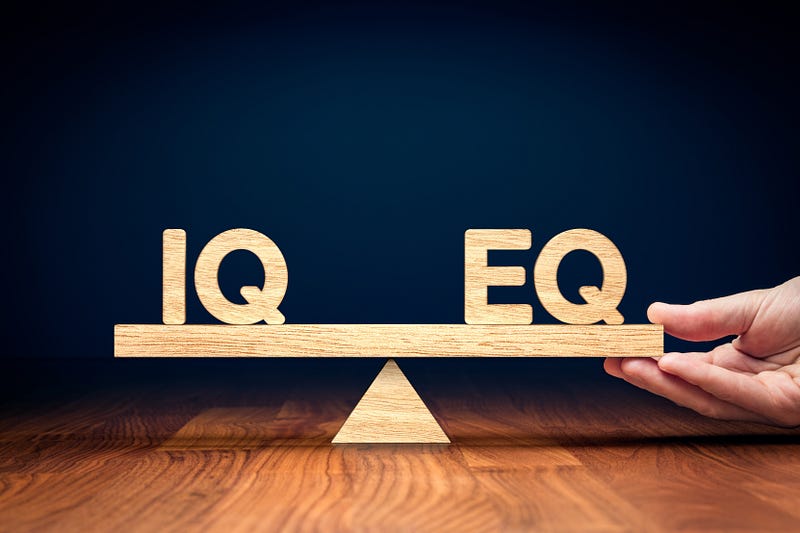The Balance of EQ and IQ: A Comprehensive Exploration of Human Intelligence
Written on
Introduction to Emotional and Intellectual Intelligence
The intricate relationship between emotional intelligence (EQ) and intellectual intelligence (IQ) often occupies my thoughts when reflecting on the concept of intelligence. My insights stem from personal experiences rather than purely academic discourse. Traditionally, intelligence has been predominantly associated with cognitive abilities such as memory, reasoning, and logic, often quantified by IQ scores. Historically, high IQ has been regarded as a benchmark for assessing potential and capability in various spheres, including workplaces, social environments, and educational settings. Throughout my academic and professional journey, I have frequently observed that individuals with high IQs tend to excel, demonstrating remarkable skills in logical reasoning and problem-solving.
However, as I progressed through different roles and environments, it became increasingly clear that an IQ-centric view of intelligence is insufficient. Many instances of personal and professional success rely equally on emotional intelligence. EQ, which encompasses the ability to recognize, understand, and manage one's own emotions as well as those of others, is often as crucial—if not more so—than cognitive prowess. For instance, in leadership positions, skills like conflict resolution, empathy, and the ability to inspire are just as vital as strategic decision-making. This realization has profoundly reshaped my understanding of intelligence, underscoring that while IQ is significant, it represents only a fraction of the broader intelligence narrative.
As we advance further into the twenty-first century—a time characterized by automation and artificial intelligence—the importance of emotional intelligence becomes ever more pronounced. In an age where machines can replicate or surpass human cognitive functions, our distinct ability to feel, understand, and express emotions sets us apart. Emotional intelligence is essential for navigating complex social landscapes, fostering deep connections, and cultivating compassionate communities. These skills are invaluable in both personal and professional contexts.
The Evolving Concept of IQ: A Historical Perspective

Understanding cognitive abilities has long hinged on the intelligence quotient, or IQ. Historically, IQ tests have measured various skills, including linguistic ability, spatial reasoning, logical thinking, and mathematical prowess. These assessments were thought to provide a clear indication of an individual’s intellectual capacity and likelihood of success in academic and professional realms. The prevailing belief that a high IQ signifies the pinnacle of intelligence has shaped conventional wisdom. In my educational and professional experiences, individuals with elevated IQs typically excelled in analytical tasks and problem-solving scenarios, exhibiting exceptional expertise in their respective fields.
However, this narrative regarding IQ is undergoing a transformation. It is becoming evident that while IQ tests hold value, they do not encapsulate the entirety of an individual's intellectual and personal potential. These assessments primarily evaluate convergent thinking, or the ability to arrive at the "correct" answer for common problems that may not necessitate originality or emotional insight. This understanding has begun to reshape perceptions of intelligence, prompting inquiries into the definitions and measures of genuine cognitive achievement. A broader conception of intelligence has emerged, recognizing that IQ tests fail to account for creativity, practical problem-solving, emotional intelligence, and social awareness.
This shift in perspective highlights the notion that although IQ can predict certain types of success in academics and careers, it is not the sole determinant of life success. Observations of emotionally intelligent responses saving lives in critical situations emphasize the limitations of relying solely on IQ. It has become increasingly apparent that a synthesis of emotional intelligence (EQ) and cognitive intelligence (IQ) is necessary to adeptly navigate the complexities of life.
The Rise of EQ: The Heart's Intelligence

The traditional IQ-centric view of intelligence has experienced a dramatic shift with the ascent of emotional intelligence (EQ) within discussions of professional success and personal growth. Growing awareness of the importance of managing emotions—both one’s own and those of others—has led to a recognition that EQ is often more critical for success than IQ alone. This form of intelligence involves a nuanced understanding of emotional landscapes, including the ability to recognize personal emotions, interpret the feelings of others, and apply emotional insights in decision-making.
In my various leadership roles, I have witnessed that individuals skilled in emotional intelligence tend to cultivate stronger interpersonal relationships, navigate social challenges more effectively, and create environments conducive to well-being and productivity. Empathy, self-regulation, motivation, and social skills comprise the essence of EQ, which is essential in both personal and professional settings.
The increasing acknowledgment of emotional intelligence is transforming how talent and leadership are perceived. Unlike IQ, which is relatively stable throughout a person's life, EQ can be developed and enhanced through conscious effort and awareness. Real-world experiences have demonstrated that emotionally intelligent leaders excel in motivating their teams, managing stress and conflict, and maintaining positive workplace cultures, all contributing to heightened productivity and job satisfaction.
The Interplay of EQ and IQ

The dynamic interplay between EQ and IQ provides a more nuanced and holistic view of human potential. While IQ primarily assesses cognitive abilities like reasoning and memory, EQ reflects the capacity to regulate emotions in oneself and others. Despite their distinctions, these two forms of intelligence are deeply interconnected. In practice, an individual’s EQ can significantly enhance or impede the effectiveness of their IQ.
For example, I have observed that individuals with high IQs but low EQs often struggle with leadership and teamwork. While they may excel in roles requiring critical thinking, they frequently falter in situations demanding empathy, collaboration, or persuasion. Conversely, individuals with high EQs, regardless of their IQ levels, often navigate social complexities and lead teams more effectively. This intersection illustrates the necessity of integrating the analytical capabilities of IQ with the social and emotional intelligence of EQ to unlock our full potential across various life domains.
The interaction between EQ and IQ also influences how individuals approach opportunities and challenges. A high-IQ individual may excel at solving technical problems or devising strategic plans, yet may overlook emotional cues and underlying dynamics essential for executing those plans collaboratively. On the other hand, a person with a high EQ may instinctively recognize these dynamics, adjusting plans as necessary to ensure cohesive execution and teamwork. This interaction shapes our decision-making, relationship-building, and successful leadership within the broader context of personal and professional development.
Real-World Applications: From Corporate Boardrooms to Family Life

The relationship between EQ and IQ is prominently illustrated in the business arena. Consider a high-level CEO with exceptional IQ, proficient in strategy development, but lacking emotional intelligence. Such a leader may excel in analytical tasks and crafting intelligent business plans but may struggle to inspire and effectively lead their team. In contrast, leaders with high EQ, even if their IQs are comparatively lower, often succeed in motivating employees, managing conflicts, and fostering a positive workplace atmosphere. They recognize that the individuals who create and deliver products and services are the true assets of a business.
Similarly, the balance between EQ and IQ is crucial in personal and family life. Skills such as understanding, managing, and empathizing with others are vital in close relationships and parenting. While a high IQ can assist in rationally addressing life’s challenges or making informed decisions regarding finances, education, and career progression, emotional intelligence often plays a pivotal role in facilitating effective communication with partners, comprehending the unspoken needs of family members, and aiding children in navigating the intricate terrain of emotions and social dynamics. The delicate balance of rationality and empathy fosters a nurturing home environment and strengthens family ties.
Developing a Harmonious Balance of EQ and IQ

Achieving a balance between EQ and IQ is essential in both personal and professional lives, yet it remains a dynamic and evolving endeavor. While IQ is generally viewed as a static measure of cognitive abilities, including analytical skills, EQ is more adaptable and can be cultivated through deliberate practice. The journey begins with self-awareness—the ability to recognize and understand one’s feelings. This encompasses motivation, self-regulation, empathy, and social skills. Through my experiences, I have found that techniques such as reflective writing, mindfulness meditation, and active engagement in emotional intelligence training have proven beneficial. Not only have these practices enhanced my emotional intelligence, but they have also enabled me to better understand and connect with others.
Moreover, developing EQ is inherently collaborative. Learning from real-world experiences and interactions with others enhances emotional intelligence. For instance, engaging in empathetic conversations and practicing active listening enriches our emotional intelligence by allowing us to better comprehend and resonate with the feelings of others. Additionally, employing EQ in building and maintaining relationships, as well as in conflict resolution at work and home, is crucial for both professional and personal growth.
Recognizing and strategically leveraging the strengths and weaknesses of each form of intelligence is vital for achieving a balance between EQ and IQ. While decision-making often requires the logical analysis characteristic of high IQ, EQ plays a significant role in understanding the emotional repercussions of those decisions and how they are communicated and executed. Therefore, cultivating a healthy equilibrium between EQ and IQ transcends personal improvement; it enhances our ability to contribute meaningfully to the world, foster closer connections with others, and lead more fulfilling lives.
The Shift in Academic and Corporate Frameworks

The significance of emotional intelligence (EQ) is gaining recognition, prompting substantial changes in corporate training programs and educational systems worldwide. A more holistic development model is replacing the traditional focus on academic performance and cognitive skills in educational settings. This model emphasizes social and emotional learning (SEL), prioritizing interpersonal skills, self-regulation, and empathy. Educational curricula increasingly incorporate these elements to equip students with the emotional and social competencies necessary for success in the real world, alongside academic knowledge.
This transformation acknowledges that the workforce of the future will demand emotional intelligence in addition to technical expertise to navigate an increasingly complex and globalized business landscape. From my observations in educational environments, students engaged in SEL programs tend to exhibit improved classroom behavior, heightened motivation to learn, and enhanced conflict resolution skills, all of which lay the groundwork for long-term success in personal and professional domains.
The corporate sector has also recognized the value of integrating emotional intelligence (EQ) into training and development initiatives. Organizations are increasingly aware that employees with high emotional intelligence can enhance team dynamics, foster a positive workplace culture, and effectively manage client relationships. Consequently, corporate training programs are now incorporating modules aimed at developing emotional regulation, empathy, and effective communication. This trend is particularly crucial for leadership roles, as the ability to understand and manage one's emotions, along with those of others, significantly influences decision-making and team morale.
Based on my professional observations, companies prioritizing EQ in their leadership development initiatives have reported improved crisis management, sustainable growth, and heightened employee satisfaction. This shift underscores a more sophisticated understanding of what constitutes organizational success: employees who are not only intellectually adept but also emotionally intelligent and skilled in navigating the complexities of the modern corporate environment.
Personal Experiences and Broader Implications

Reflecting on my personal experiences, I am consistently reminded of the interplay between EQ and IQ, particularly in leadership and team dynamics. For instance, early in my career, I observed a highly intelligent team member lead a project that encountered significant challenges. This high-IQ leader excelled at strategizing and resolving complex issues but struggled to navigate the emotional landscape of the team, resulting in increased stress and poor collaboration. Conversely, I witnessed a colleague with modest academic credentials thrive in her leadership role due to her strong emotional intelligence. Her ability to empathize with team members, understand their motivations, and foster open communication ensured project success and a harmonious team environment. These experiences reinforced the idea that while IQ can facilitate entry into leadership positions, it is often EQ that distinguishes successful and respected leaders.
These anecdotal accounts highlight broader societal implications. In a rapidly evolving technological landscape, emotional intelligence (EQ) is emerging as a uniquely human trait that machines cannot replicate. As automation and AI increasingly assume cognitive, task-oriented roles, the demand for empathy, creativity, and effective communication skills will likely rise. This shift necessitates a reevaluation of educational and career advancement strategies, ensuring that systems prioritize the development of social and emotional skills alongside technical knowledge. Striking a balance between IQ and EQ is paramount not only for individual growth and success but also for preparing individuals for a future where emotional intelligence may become our most valuable asset.
Conclusion: Embracing the Interdependence of EQ and IQ
As we delve into the complexities of EQ and IQ, it becomes evident that both are integral to shaping our relationships, careers, and overall lives. In an era that often celebrates intellectual prowess and technological advancements, the significance of emotional intelligence—the ability to recognize, regulate, and express emotions while managing interpersonal relationships with insight and empathy—grows increasingly clear. It serves as a reminder of our humanity, providing a counterbalance to the often cold rationality of IQ.
Throughout my diverse experiences in various personal and professional contexts, I have repeatedly observed that achieving this balance is vital for overall success and fulfillment. Whether we are leading a team, nurturing a family, or engaging with our communities, cognitive understanding and emotional empathy work in tandem to yield positive outcomes and foster meaningful connections.
Looking ahead, I envision a society where EQ could become a critical differentiator. In a world dominated by intelligent machines and data-driven decision-making, human empathy, understanding, and connection will likely be recognized as hallmarks of true intelligence. As educators, leaders, parents, and individuals, it is our responsibility to nurture the next generation's development of both EQ and IQ. This involves reimagining educational and career-development initiatives to prioritize emotional intelligence competencies while enhancing cognitive abilities.
By doing so, we position ourselves to thrive in a rapidly changing world while also promoting the emotional and social well-being of our communities. Ultimately, the journey to understand and value both EQ and IQ is ongoing and dynamic. It requires reflection, dedication, and intentional effort to cultivate areas that may not come naturally. Yet, the rewards of this journey—improved relationships, effective leadership, and a more compassionate existence—are substantial. Fostering the coexistence and growth of EQ and IQ in our educational systems, workplaces, and personal lives is essential for cultivating a more empathetic, understanding, and collaborative world.
My Recommended Reads on Emotional Intelligence
- Emotional Intelligence: Why It Can Matter More Than IQ by Daniel Goleman
- Primal Leadership: Realizing the Power of Emotional Intelligence by Daniel Goleman
- The 7 Habits of Highly Effective People by Stephen Covey
- The Language of Emotions: What Your Feelings Are Trying to Tell You by Karla McLaren
- The Emotionally Intelligent Manager: How to Develop and Use the Four Key Emotional Skills of Leadership by David R. Caruso and Peter Salovey
- Master Your Emotions: A Practical Guide to Overcome Negativity and Better Manage Your Feelings by Thibaut Meurisse
- Emotional Intelligence 2.0 by Travis Bradberry & Jean Greaves
- Dare to Lead: Brave Work. Tough Conversations. Whole Hearts by Brené Brown
The first video titled "IQ vs. EQ: What's More Important?" explores the comparative significance of intellectual and emotional intelligence in achieving success.
The second video titled "EQ versus IQ: Understand the Science of Human Connection!" delves into the science behind emotional intelligence and its impact on human relationships.